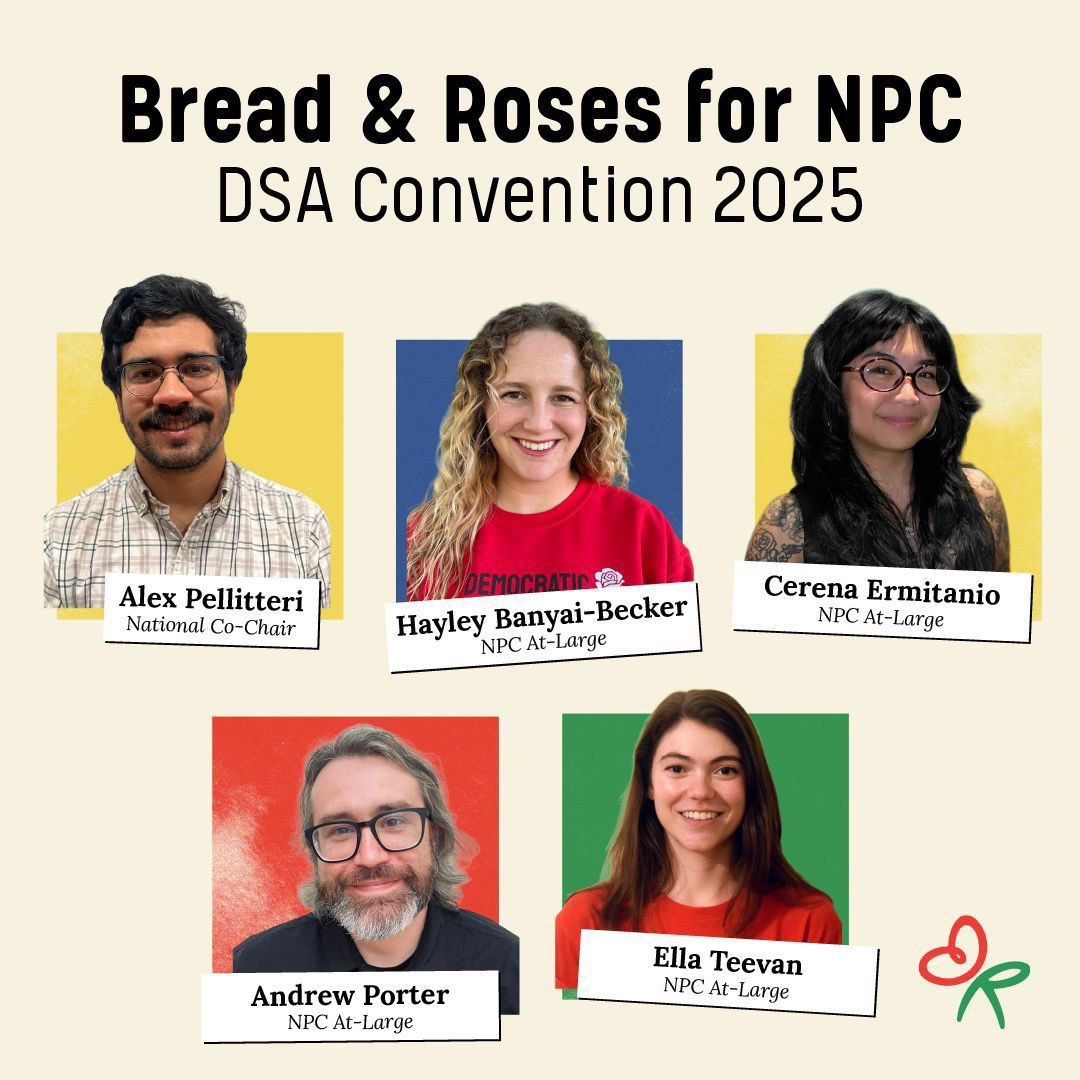DSA is missing an essential component of powerful political organizations: active and public political leadership. The structure of DSA’s national organization and leadership is much closer to that of a typical non-profit than that of a mass workers’ party.
In the non-profit or corporate model, a part-time volunteer board of directors sets the priorities and direction of the organization and then hires a CEO to carry out those priorities and run the organization on a day-to-day basis. Likewise in DSA, the National Political Committee (NPC) functions as our volunteer board of directors: it sets the organization’s overall direction, decides larger questions and then hires the national director, our “CEO,” to handle the day-to-day administration of the organization.
Mass membership workers’ parties around the world — like Sinn Fein in Ireland and Die Linke in Germany — elect an executive leader or leaders (often called the party “leader,” “president,” or “chair”) at their conventions. These political leaders are charged with representing the party externally to unions, other organizations, and the general public and help oversee the internal administration of the party. To be able to carry out these responsibilities, these positions are full-time and paid.
To build a more effective DSA capable of building a mass socialist working-class movement, Bread & Roses submitted “Member Resolution #3: Resolution on Full-Time National Chairs” to empower our elected leadership to lead and move DSA toward a more party-like structure.
Paid Political Leadership to Build DSA’s Public Profile
The model of these parties around the world is a stark contrast with DSA’s structure. Because NPC and NPC Steering Committee members often have their own full-time jobs, they have less time to dedicate to either the internal direction of DSA or to external political leadership. As a result of these limitations, we don’t have political leaders who can act as DSA’s public spokespeople. We don’t have anyone who can go on the news to give our socialist analysis on recent political developments, someone who can meet and coordinate with our elected officials in Congress, or someone who can show up and speak at a labor rally and build relationships with union leaders. While on paper, this role is assigned to our national director, in practice our national director does not do these tasks, nor would it be desirable for an unelected leader without a political mandate from the members to do it.
These tasks are essential for any serious political organization. Michael Harrington, one of DSA’s original founders and leaders in part built DSA through his national speaking tours and fundraising efforts. Similarly, to reach millions with our message and invite them to join our movement or organization, we should be constantly presenting analyses about politics and current events to the world through media efforts and spokespeople elected to do so.
We should hope for our public-facing elected leadership to become household names and for our organization’s positions to be considered alongside those of the Democrats and Republicans. Full-time salaried co-chairs would also expand our fundraising capacity, with elected leaders plugging DSA in mainstream media and touring the country recruiting members and raising money for our organization. Our paid leadership could develop closer relationships with socialists in office, and work to coordinate with them far more than a part-time leadership has the capacity to do. All of these efforts would move DSA toward a more party-like organization capable of transforming the world.
A Democratic Organization is an Effective One
Because NPC members have limited disposable time to carry out key political and organizational functions, many important decisions fall to our unelected management and director-level staff. As director-level staff work full time and build institutional knowledge, they carry a significant degree of soft power in directing our internal administration. This leads to an elected leadership that tends to follow staff direction and take less initiative in launching and sustaining exciting internal and external projects. Major decisions about allocating resources, hiring staff, and whether or not to embark on important political work end up left to director-level staff. These decisions are inherently political and should be democratically decided by our members and elected political leaders. In a political organization, our staff are meant to be carrying out our political priorities as established and directed by the membership and our elected leaders, not the other way around.
For instance, hiring a labor staffer was mandated at three conventions in a row but it took over five years and significant internal organizing against the hesitations of director-level staff to finally carry through the multi-convention mandate. Similarly, when YDSA sought to hire a second staffer, it took a lot of internal organizing to overcome objections from director-level staff to win these important resources. Similar fights had to take place, and be brought out into the public, to successfully secure member contacts for the National Labor Committee’s (NLC) outreach efforts.
Staff hold key information that is not always shared with the NPC. For instance, staff complete most of our member-funded budget and then bring it to the NPC without line-item details, making it difficult to assess the effectiveness of our spending and promoting a culture of rubber-stamping nearly the entire staff-determined budget. And director-level staff consistently push back against member-determined priorities. The past two years, matching funds for chapters to open offices and hire staffers, passed at the 2021 convention, was consistently delayed due to director-level staff reservations.
If our elected leaders are part-time volunteers with full-time jobs, it will always be an uphill battle to carry out the democratic decisions of our members and launch and lead external campaigns and internal projects that build working-class power. The time and energy required to organize for member-determined priorities in the face of these organizational roadblocks requires full-time salaried elected positions with a serious democratic mandate. And through this expanded capacity and a greater degree of member-control, our members and leaders can work to build a new democratic culture for DSA where these struggles become unnecessary.
Resolution on Full-Time National Chairs
“Resolution on Full-Time National Chairs” seeks to address these issues by bringing back the positions of DSA national co-chairs. According to the DSA Constitution and Bylaws, the DSA convention may decide to elect a national chair or co-chairs, who shall be DSA’s “primary spokespersons.” In DSA’s 40-year history, only two people — Barbara Ehrenreich and Michael Harrington — have served as national co-chairs and the position has remained vacant since the death of Harrington in the late ‘80s. This resolution would resurrect this position, calling for national co-chairs to be elected via the procedure outlined in the constitution following this convention. It would also make the co-chairs full-time salaried positions and reserve them a spot on the NPC.
Internally, the co-chairs would coordinate with DSA’s national director and director-level staff to carry out DSA’s political priorities. Externally, the co-chairs will act as official spokespeople of the organization, communicating DSA’s principles and priorities to the broader public, meeting with leaders of unions and other political organizations, and coordinating with our elected officials in Congress, among other responsibilities.
The national co-chairs would report to the NPC and its Steering Committee and follow their direction. The NPC will retain their constitutional ability to remove the co-chairs for malfeasance or nonfeasance by a 2/3rds supermajority vote. The national director would report directly to the national co-chairs on a daily basis, while also reporting to the NPC and the SC as a whole.
Bread & Roses is also sponsoring an amendment to have the national convention directly elect the national co-chairs. Following this year’s convention, the co-chairs would be directly elected by convention delegates from the pool of members elected to the NPC. Starting at the 2025 convention, the co-chair elections would precede the at-large NPC election, giving losing co-chair candidates the opportunity to run for one of the at-large NPC spots.
As a democratic organization, it’s important that our main political leadership and public spokespersons be directly elected by the convention. This would both require co-chair candidates to campaign for the position before the whole membership and convention, and give co-chairs a strong political mandate to carry out their work. Through the Bread & Roses proposed Democracy Commission, we can assess the success of this structural change, and party structures around the world, and come back together in two years to determine the best way to expand our salaried officer positions.
In these next two years though, to build DSA into the powerful member-led organization truly capable of transforming the world we know it can be, we need full-time paid national co-chairs elected by the convention. Vote “yes” on Member Resolution #3, “Resolution on Full-Time National Chairs.”




